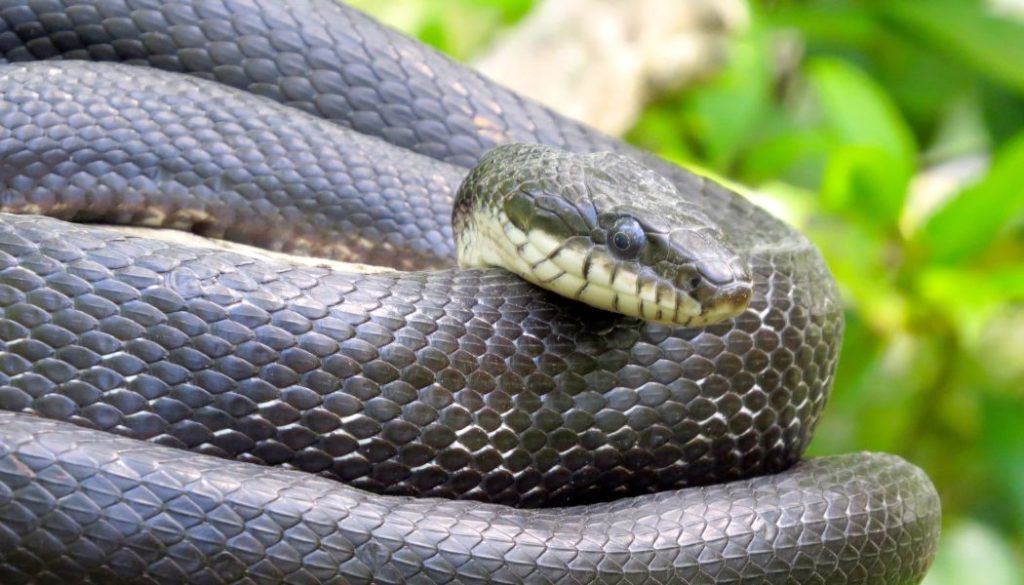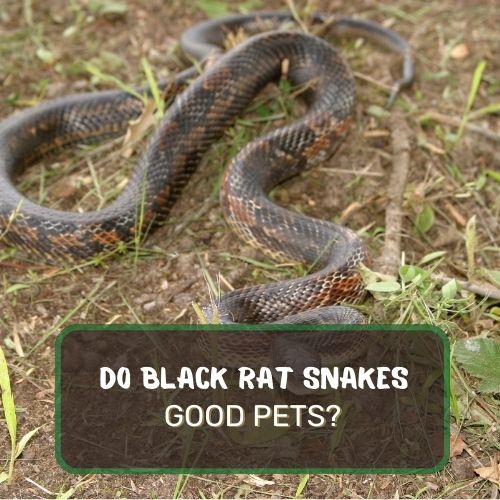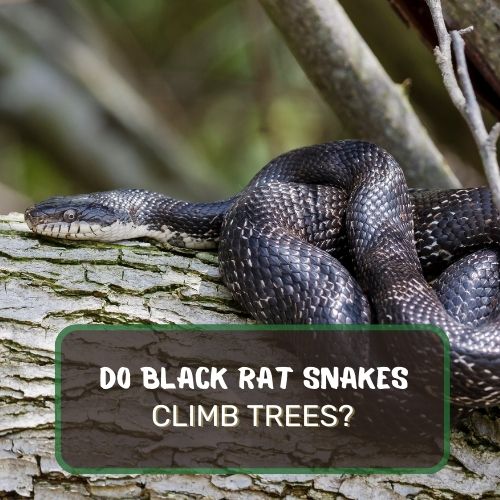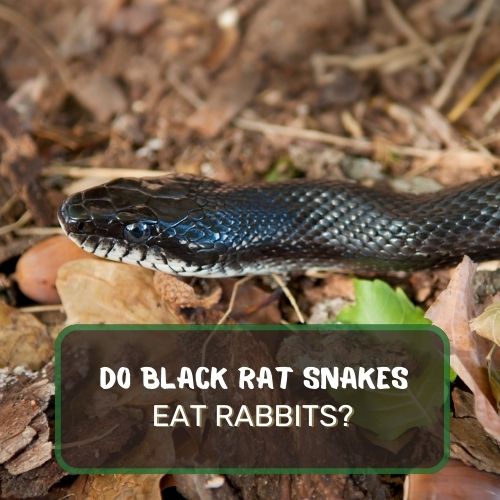Welcome to our exploration of one of nature’s fascinating creatures: the black rat snake.
Often shrouded in mystery and misconceptions, these snakes spark curiosity and sometimes fear. In this article, we delve into a pressing question: Do black rat snakes have fangs?
No, black rat snakes do not have fangs. Instead, they possess small, sharp teeth used for gripping prey, not for injecting venom. They are non-venomous constrictors, relying on their strength to subdue prey rather than venom.
We’ll uncover the truth about their dental anatomy, compare them with venomous snakes, and clarify their non-venomous nature.
Additionally, we’ll explore their diet, hunting methods, and the appropriate response to a rare bite incident.
We’ll also address concerns about pet safety around these snakes. Get ready to unravel the myths and understand the reality of black rat snakes.

Table of Contents
- 1 Teeth and Fangs: Lack of Venomous Fangs, Presence of Small Teeth
- 2 Comparison with Venomous Snakes and Clarification of Non-Venomous Nature
- 3 Overview of Their Diet and Hunting Methods
- 4 What to Do if Bitten by a Black Rat Snake and First Aid Measures
- 5 Safety Around Domestic Animals and Lack of Threat to Pets
- 6 Final Take
- 7 FAQ
Teeth and Fangs: Lack of Venomous Fangs, Presence of Small Teeth
When it comes to black rat snakes, one of the most common questions is whether they have fangs. The answer is a resounding no. Unlike their venomous counterparts, black rat snakes are not equipped with fangs. Instead, they possess small, sharp teeth. These teeth are designed not for injecting venom, but for gripping and holding their prey.
Picture this: you’re walking through a forest and you come across a black rat snake. You notice its mouth – no long, needle-like fangs in sight, just rows of tiny, sharp teeth. These teeth play a crucial role in their hunting strategy.
Black rat snakes are constrictors, which means they capture their prey, such as rodents or birds, with a quick strike and then coil around them, using their muscular bodies to suffocate the prey. The teeth are there to hold on to the prey during this process.
Interestingly, the absence of fangs in black rat snakes often leads to a common misconception. They’re sometimes mistaken for venomous snakes, causing unnecessary panic. In reality, their dental structure is a testament to their role as non-venomous predators in the ecosystem.
Comparison with Venomous Snakes and Clarification of Non-Venomous Nature
Understanding Venomous Fangs
To fully appreciate the nature of black rat snakes, it’s essential to understand how they differ from their venomous relatives.
Venomous snakes, like rattlesnakes or copperheads, are equipped with specialized fangs that they use to inject venom into their prey. These fangs are like hypodermic needles – sharp, elongated, and connected to venom glands.
The Non-Venomous Black Rat Snake
Black rat snakes, on the other hand, lack these venom-delivery systems. Their teeth are meant for grasping, not for venom injection. This distinction is crucial for understanding their behavior and role in nature.
While venomous snakes often use their venom both for subduing prey and as a defense mechanism, black rat snakes rely on their strength and agility.
A fascinating aspect of black rat snakes is their ability to mimic venomous snakes as a defense strategy. When threatened, they may coil up and hiss, leading some to mistakenly believe they are venomous.
However, this is simply a bluff; a black rat snake’s bite, while possibly painful due to the sharp teeth, carries no venom and is rarely dangerous to humans.
In conclusion, black rat snakes are a perfect example of nature’s diversity. Their lack of fangs and venom puts them in a different category from many feared serpents, highlighting their unique place in the natural world. Understanding this difference is key to appreciating these fascinating creatures and their role in maintaining ecological balance.
Overview of Their Diet and Hunting Methods
Black rat snakes, as their name suggests, have a diet primarily focused on rodents. Mice, rats, and even squirrels form a significant part of their diet. However, their menu isn’t limited to just rodents.
These adaptable snakes also consume birds, bird eggs, and occasionally amphibians and small reptiles. Their hunting method is as intriguing as their diet is varied.
Imagine a black rat snake in the wild. It uses stealth and patience, quietly waiting or slowly stalking its prey. Once it spots a target, the snake strikes quickly, seizing the animal with its sharp teeth. After the swift strike, the black rat snake employs its most renowned technique – constriction.
It wraps its powerful body around the prey, tightening its coils with each breath the prey takes, eventually leading to suffocation. This method is both efficient and effective, allowing the snake to subdue animals that might otherwise be too large or strong to handle.
It’s this combination of stealth, speed, and strength that makes the black rat snake a formidable hunter. Their role in controlling rodent populations is invaluable, making them an important part of the ecosystem.
What to Do if Bitten by a Black Rat Snake and First Aid Measures
Steps to Follow
- Stay Calm and Move Away: If bitten by a black rat snake, the first step is to remain calm and gently move away from the snake to prevent further bites.
- Clean the Wound: Wash the bite area with soap and water. This helps to remove any bacteria that the snake’s teeth may have introduced into the wound.
- Observe the Bite: Keep an eye on the bite site for any signs of infection, such as excessive redness, swelling, or pus.
- Apply a Bandage: Cover the wound with a clean, dry dressing. This helps to protect it from infection.
- Pain Management: If necessary, take over-the-counter pain relief medication to alleviate discomfort.
- Monitor for Allergic Reactions: While black rat snake bites are non-venomous, some individuals may experience an allergic reaction. Symptoms can include difficulty breathing, swelling of the face or limbs, and dizziness.
- Seek Medical Attention: If there are any concerns about the wound, such as possible infection or an allergic reaction, it’s essential to seek medical attention promptly.
- Tetanus Shot: Consider whether you’re up-to-date on your tetanus vaccination, as it’s recommended every ten years. If in doubt, consult a healthcare provider.
- Rest and Elevate: Rest and keep the bitten limb elevated to reduce swelling.
- Avoid Folk Remedies: Steer clear of folk remedies and old wives’ tales, such as sucking out the venom or applying ice, as these can do more harm than good.
It’s important to remember that black rat snake bites, while potentially painful and alarming, are generally not dangerous. Following these steps ensures proper care and minimizes the risk of complications.
Safety Around Domestic Animals and Lack of Threat to Pets
For pet owners, the presence of black rat snakes in the vicinity often raises concerns about the safety of their domestic animals. However, it’s reassuring to know that these snakes pose minimal threat to pets.
Black rat snakes, by nature, are not aggressive towards larger animals like dogs or cats. Their primary prey consists of smaller animals, mainly rodents and birds.
Consider a scenario where a black rat snake and a pet encounter each other. More often than not, the snake’s first instinct is to flee rather than confront.
If cornered or threatened, the snake might exhibit defensive behavior, such as hissing or coiling, but it’s unlikely to attack a larger animal. In fact, instances of black rat snakes biting pets are extremely rare and usually occur only when the snake is provoked or feels threatened.
For the most part, pets and black rat snakes can coexist peacefully, especially if pets are supervised while outdoors. This harmonious coexistence is beneficial, as black rat snakes play a crucial role in controlling rodent populations, indirectly protecting both pets and humans from potential rodent-borne diseases.
Final Take
You now know that black rat snakes, despite their daunting appearance, lack venomous fangs and are not a threat to you or your pets.
Their diet mainly consists of rodents, making them natural pest controllers. In the rare case of a bite, simple first aid steps are sufficient.
Embrace the presence of these fascinating creatures in the wild, understanding their crucial role in our ecosystem. Remember, coexistence and respect for wildlife are key to a harmonious natural world.
Keep exploring and learning about the incredible wildlife around us!
FAQ
What Happens if a Rat Snake Bites You?
If a rat snake bites you, you may experience mild pain and some swelling at the bite site. However, as they are non-venomous, there’s no risk of venom-induced harm.
Are Black Rat Snakes Poisonous?
No, black rat snakes are not poisonous. They are non-venomous constrictors, which means they subdue their prey through constriction rather than venom.
What to Do if a Rat Snake Bites You?
If bitten by a rat snake, clean the wound with soap and water, apply a sterile bandage, and monitor for signs of infection. If you’re allergic to snake bites or if the wound shows signs of infection, seek medical attention immediately. Additionally, ensure that your tetanus vaccinations are up to date.




0 Comments